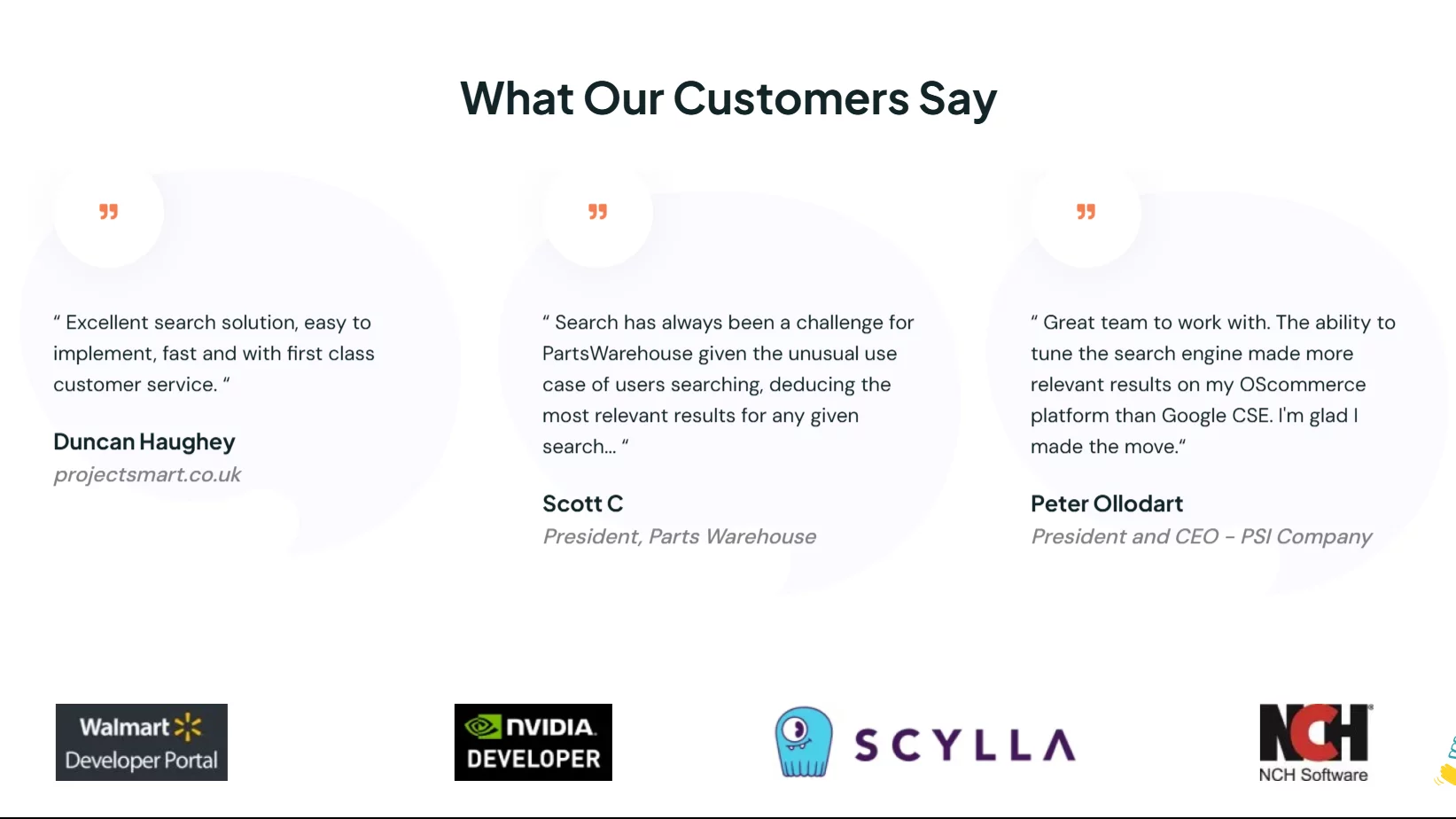Why eCommerce Brands Are Rethinking And Moving to Algolia Alternative in 2025
Site search has evolved into a strategic asset for eCommerce—not just a utility. With AI-powered personalization, voice interfaces, and lightning-fast relevance becoming standard, today’s customers expect much more. While Algolia remains a well-known player, many brands are now questioning whether its pricing model, complexity, and developer-heavy setup can keep pace with modern needs. — The reasons for switching to Algolia Alternative includes:
- Escalating costs with unpredictable overages
- Add-on pricing for critical features like AI and merchandising
- Technical overhead requiring developer time for even basic adjustments
- Lack of intuitive, no-code tools for business users
Brands today are prioritizing platforms that offer flexibility, out-of-the-box intelligence, and a low-friction experience for both developers and marketers.
What Is Algolia?
Algolia is a cloud-based, search-as-a-service platform trusted by thousands of global brands. It enables fast search across websites and applications with sub-100ms response times. Its standout capabilities include:
- Search-as-you-type experience
- Typo tolerance for misspelled queries
- Faceted navigation for filtered results
- Multi-language support
- Developer-first APIs with extensive documentation
- High availability, with enterprise SLAs up to 99.999%
Despite these strengths, Algolia can be rigid and cost-prohibitive—especially when teams grow or product catalogs expand rapidly.
Where Algolia Falls Short
- Unpredictable Pricing Structure: Costs are tied to the number of operations and records. As traffic and SKUs grow, so does your bill—unexpectedly. AI features like Recommend or NeuralSearch are sold as add-ons, further complicating budget planning.
- Heavy Developer Dependence: Customizing ranking, search rules, merchandising, and UI components requires engineering resources. This slows down marketing and merchandising teams who need agility.
- AI Isn’t Built-In: Algolia’s core offering doesn’t include AI personalization or semantic search by default. These must be layered on through additional products, increasing both complexity and cost.
- Complex Integration: Algolia offers SDKs and APIs but lacks plug-and-play modules for platforms like Shopify or Magento. Even with integrations, syncing product data or managing filters often needs custom setup.
- Limited Control for Merchandisers: Marketers can’t easily boost products, pin banners, or reorder results without code. This restricts their ability to run agile campaigns.

What eCommerce Brands Want in 2025
eCommerce success is increasingly driven by how smart and responsive your site search is. In 2025, brands are prioritizing:
- Flat, Predictable Pricing: No more query-counting or fear of overages.
- Built-in AI Capabilities: Semantic search, real-time personalization, typo correction—all included.
- Low-code/No-code Customization: Empower marketing teams to make updates instantly.
- Integrated Visual Merchandising Tools: Drag-and-drop product promotion, campaign pinning, A/B testing.
- Voice & Multilingual Search: Especially critical for mobile shoppers and international audiences.
- Quick Integration with Shopify, Magento, WooCommerce, WordPress: Fewer roadblocks, faster go-live.
- Intuitive Dashboards & Analytics: Understand search trends, zero-result queries, CTR, and revenue impact.
- 24/7 Support: Responsive, helpful, and available when your team needs it.
These expectations shape the kind of search platform modern teams are looking for—and why many are turning to Expertrec.
In-Depth Comparison: Top Algolia Alternative in 2025
1. Expertrec – Best for eCommerce Brands Wanting Built-in AI & Ease of Use
- Overview: A hosted site search solution tailored for online retailers. Offers rich features and personalization out of the box, plus a visual UI for non-tech users.
- Pricing: Starts at $49/month, with flat-rate tiers. No query-based billing or AI upcharges.
- AI Features: Semantic search, AI re-ranking, behavior-based personalization—all included in base plans.
- Merchandising: Pin products, create visual campaigns, and reorder results via drag-and-drop. No coding needed.
- Integrations: Shopify, WooCommerce, Magento, WordPress, BigCommerce—via official plugins.
- Voice Search: Available on all paid plans. No extra work or API.
- Best For: Mid-size to large eCommerce brands with growth ambition but no large dev team.

✅ Pros:
Affordable
- Transparent usage-based pricing — scales with the number of pages crawled, queries served, and frequency of updates, avoiding expensive per-record/feature plan tiers.
- Offers clear tier options (Standard, Expert, Premium) with defined caps on page indexing, search volume, campaigns, and GenieAI features .
Hybrid Vector + Keyword Search
- Implements a hybrid retrieval model—combining traditional keyword relevance (BM25-like) with semantic matching via dense embeddings, enabling intent-aware search beyond exact keyword matches .
- Uses machine learning for autocomplete ranking and typo correction, reduce zero-result searches.
AI-Powered Query Understanding
- Autocorrect & spelling tolerance: combines Levenshtein-based fuzzy logic with phonetic algorithms to auto-correct misspellings and significantly reduce null queries .
- Synonym and transliteration support — include locale-specific mappings and multilingual synonyms for languages using non-Latin scripts .
Customisable Ranking & Merchandising
- Dashboard/API-based weight rules: tailor field-level boosting (e.g., brand, category, popularity) & apply time-based promotions, pinning, or burying products programmatically or visually via UI .
- AI-assisted merchandising: auto-generates boosts or campaign suggestions based on query behavior and conversion patterns.
Advanced Crawler & Real-Time Indexing
- JavaScript-capable crawler: executes JS, handles login flows (Basic, NTLM, form-based), and indexes content behind authentication.
- Supports seed URLs, sitemaps, URL‑pattern filters, canonical tags, and selective crawling to avoid duplicates and optimize performance.
- Offers real-time flushing or scheduled recrawls (daily/weekly/monthly), ensuring live product updates without manual triggers .
eCommerce-Centric Features
- Faceted & hierarchical filters: multi-select, nested categories, price ranges, brand, availability—all configurable through dashboard/API .
- Recommendations engine: supports upsell/cross-sell logic, product bundling, “recently viewed” and “popularity-based” widgets.
- Geo-aware merchandising: location-based promotions and sorting using geolocation signals.
Comprehensive Analytics & Business Logic
- Tracks a range of metrics: query volume, no-result queries, click-through rates (top 3 positions), device breakdown, geolocation, and filter usage .
- Enables A/B testing and export of analytics data in CSV for integration into BI tools .
GenAI Chatbot & Page Summarization
- Offers a ChatGPT-based site assistant trained on your product catalog and site content for conversational search and support.
- Supports AI page summarizer, extracting key content from long pages or docs (PDF, XML, DOC) to create concise summaries.
Multilingual & Multi-Platform Support
- Indexes and searches across 30+ languages with support for Unicode, transliteration, and locale-specific tokenization/stemming .
- Seamlessly integrates via plugins or APIs with Shopify, Magento, WooCommerce, Salesforce Commerce Cloud, SAP Commerce, Commercetools, Oracle, and more.
- Handles PDFs, XMLs, CSV/JSON feeds, and image indexing for catalog enrichment through managed data source ingestion.
Developer-Friendly UI & Customization
- Exposes a REST API & JS SDK for complete control over search UI—templates, CSS, JS overrides, and embed scripts provided .
- For non-dev teams, the dashboard enables visual campaign setup, filter management, and UI tweaks without coding .
❌ Cons:
- Less developer-focused: Limited open-source.
- Limited brand awareness: Not as widely known globally.
- Documentation/UI could improve: Some users find it lacking advanced control or logs.
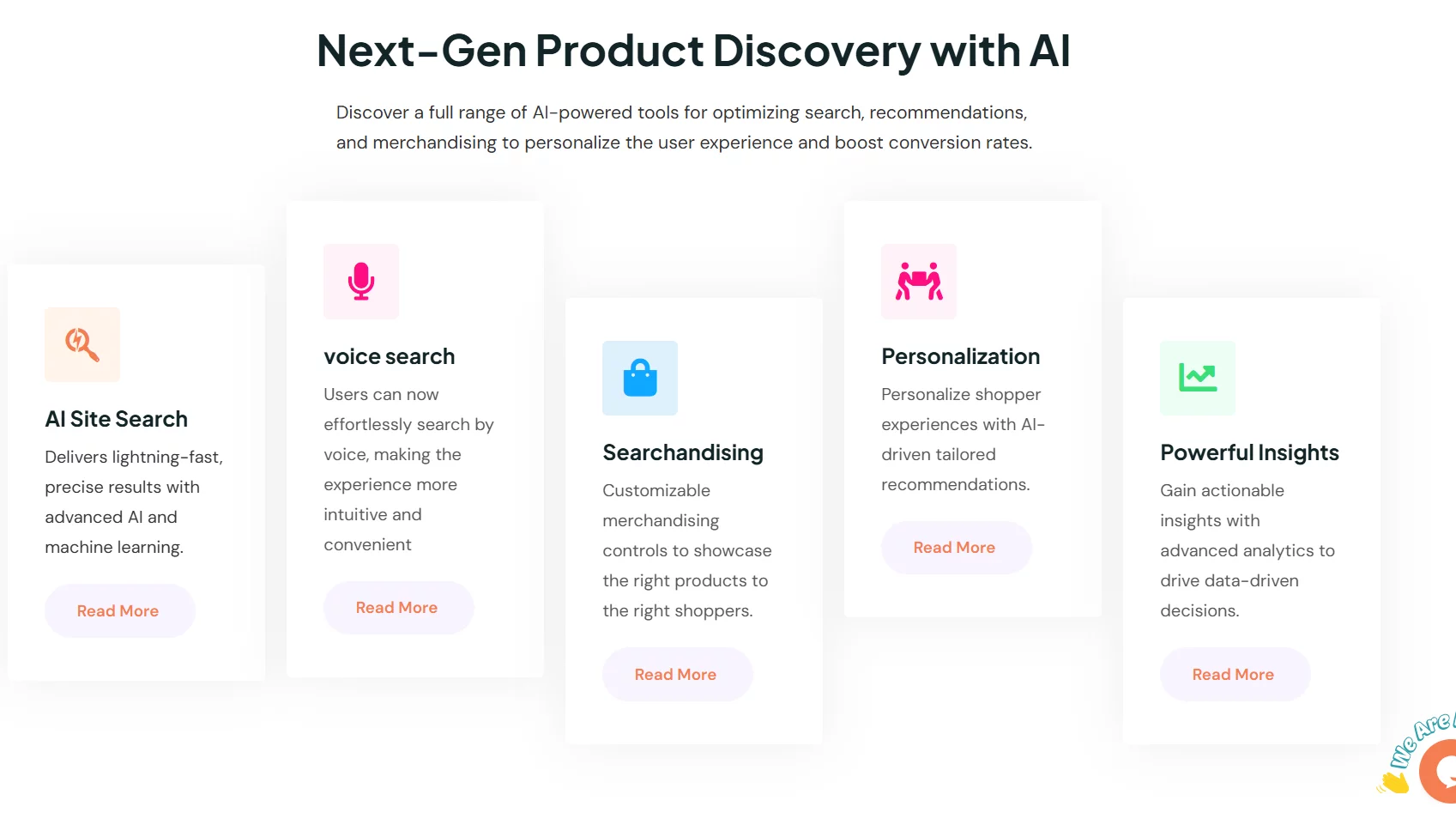
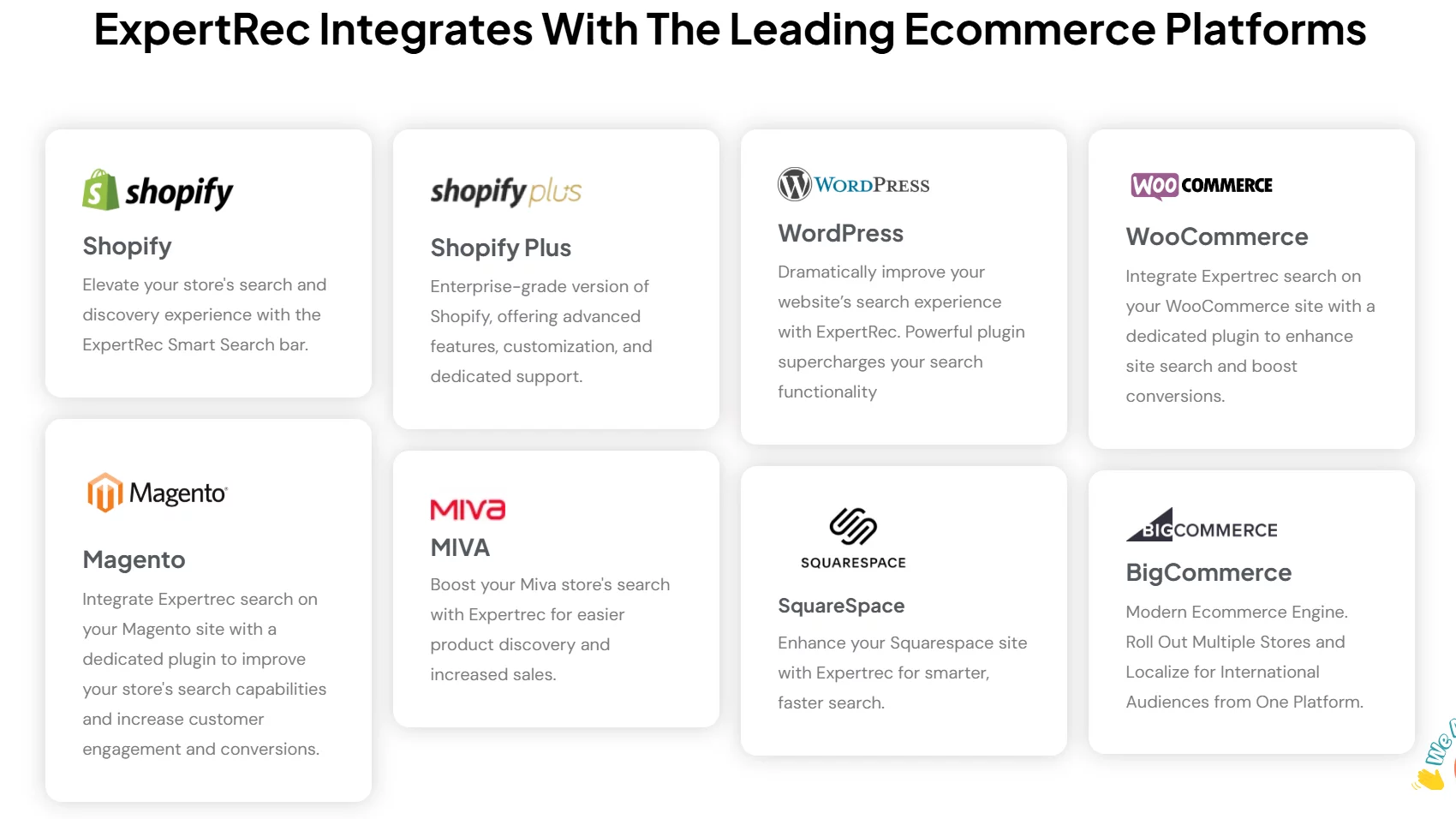
2. Meilisearch – Best for Developers Who Want Lightweight Open Source
- Overview: A Rust-based, open-source search engine offering fast, typo-tolerant, search-as-you-type.
- Pricing: Free to self-host. Paid cloud options start at $30/month.
- AI Features: None built-in. Needs external layers for personalization or semantic search.
- Merchandising: Not included. Must be built separately.
- Integrations: Requires manual work. No official eCommerce plugins.
- Best For: Developer-led teams comfortable managing infrastructure.
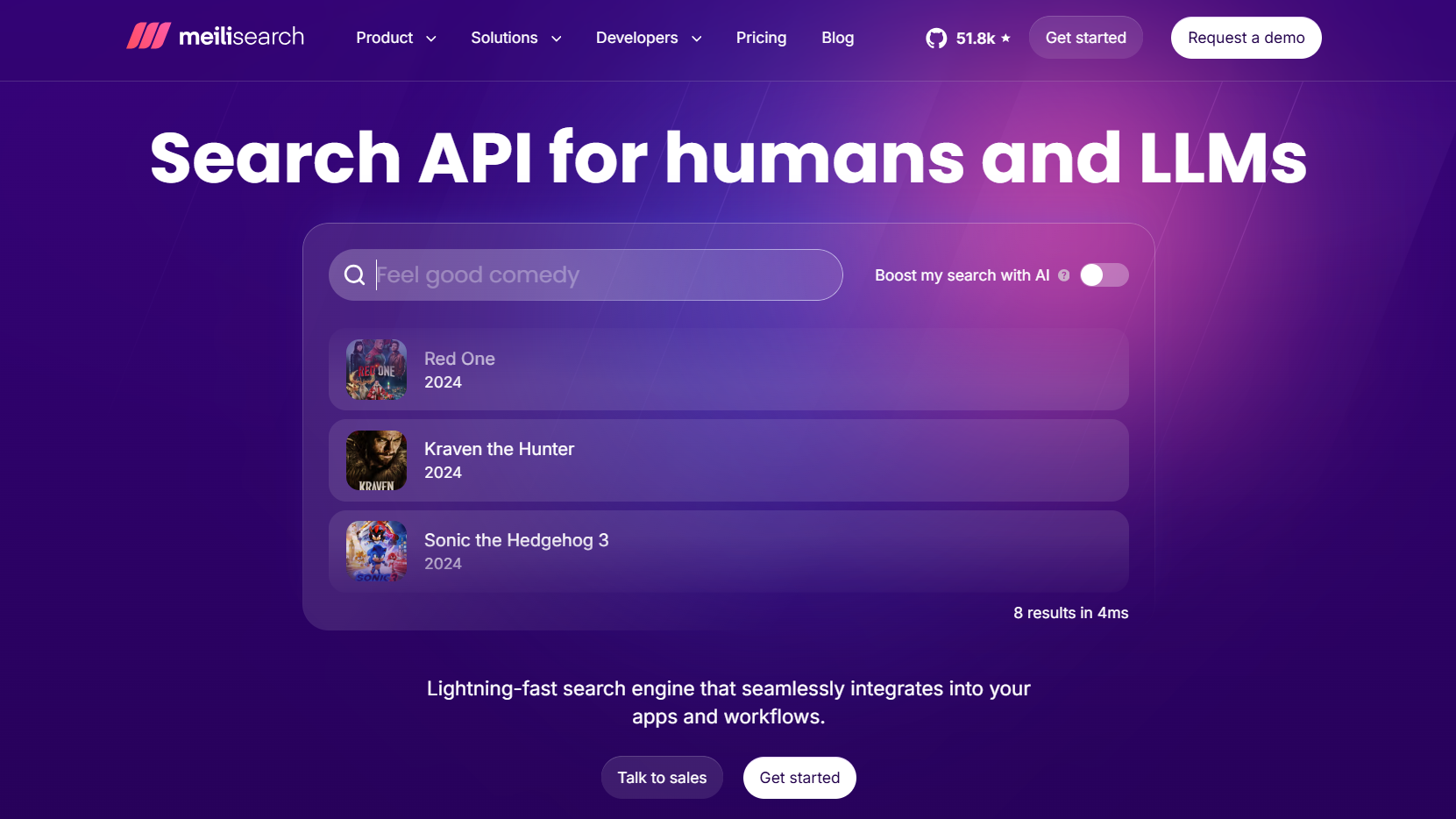
✅ Pros:
- Open-source: Fully free and self-hostable.
- Blazing fast: Designed for high-speed indexing and retrieval.
- Simple to set up: Developer-friendly API and minimal configuration.
- Typo tolerance and relevance: Built-in support for fuzzy search.
- Lightweight: Minimal dependencies and fast performance even on small servers.
❌ Cons:
- Lacks enterprise features: No advanced merchandising, personalization, or AI-based ranking.
- No built-in analytics: Requires external tools for insights.
- Limited scalability tools: Not ideal for massive datasets out-of-the-box.
- Requires development effort: Not a plug-and-play solution for non-tech teams.
3. Elasticsearch – Best for Enterprises with Custom Infrastructure
- Overview: Open-source, enterprise-grade search engine that powers massive datasets. Highly customizable.
- Pricing: Free to self-host; Elastic Cloud starts ~$95/month.
- AI Features: Available via machine learning plugins and learning-to-rank setups.
- Merchandising: None by default. Must be developed internally.
- Integrations: Powerful but time-intensive. Requires engineering resources.
- Best For: Enterprises that want full control and can handle ops complexity.
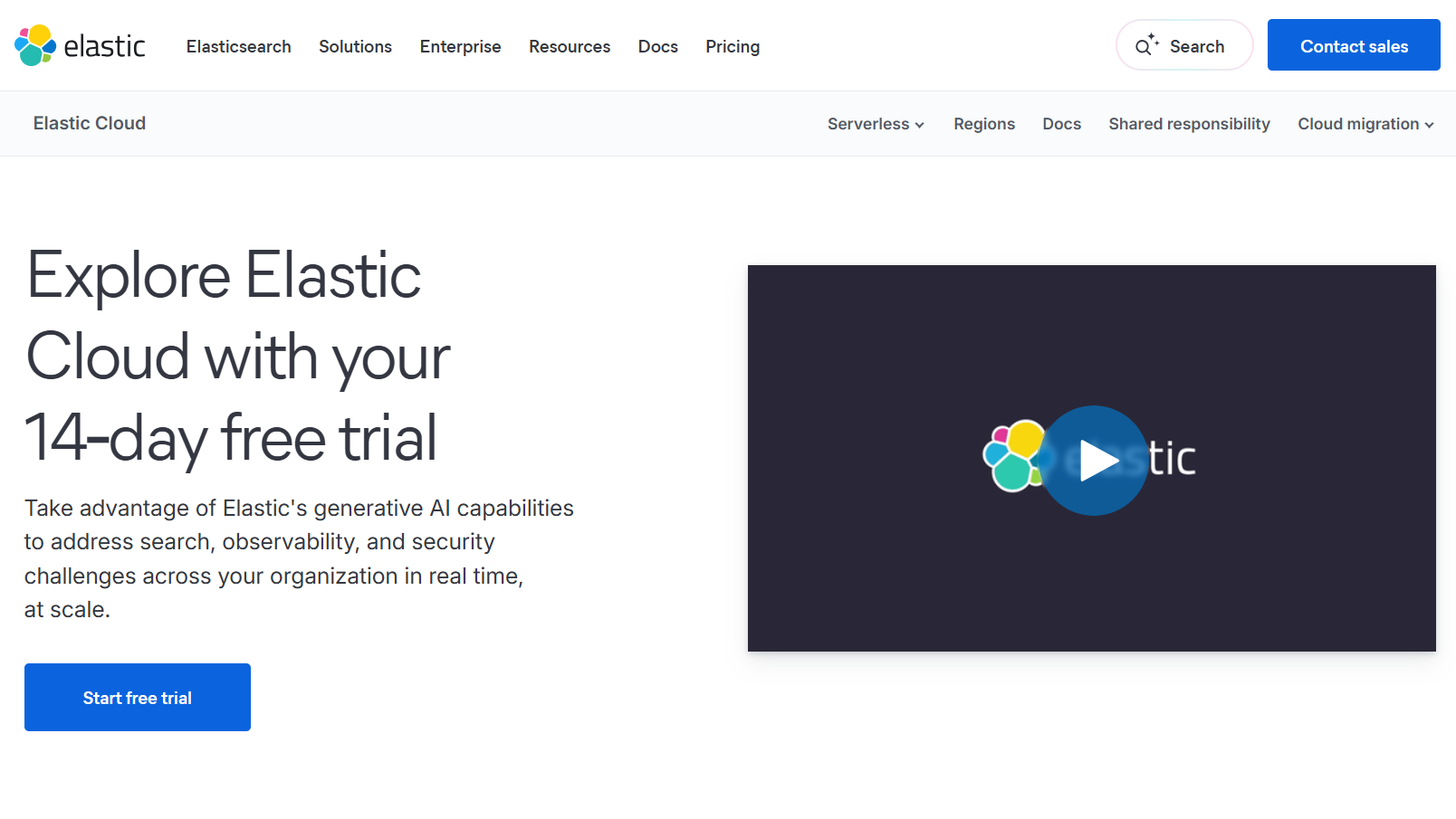
✅ Pros
- Highly scalable: Handles massive datasets and complex queries at enterprise scale.
- Powerful full-text search: Industry-leading relevance, filtering, and scoring features.
- Open-source core: Community version is free and customizable.
- Rich query DSL: Deep control over how data is searched, scored, and aggregated.
- Multilingual support: Supports dozens of languages with analyzers and stemming.
- Advanced use cases: Suitable for logs, product search, autocomplete, and geo search.
❌ Cons
- Complex to set up: Requires deep technical expertise to install, configure, and scale.
- Heavy resource usage: High RAM and CPU requirements at scale.
- No native UI tools: Requires custom frontend for search interfaces.
- No built-in merchandising: Lacks product pinning, redirects, or rule-based ranking.
- Slow for small teams: Overkill for lightweight or plug-and-play search needs.
- Costly managed services: Elastic Cloud or alternatives can be expensive.
- Lacks AI relevance by default: Needs external tools for semantic/vector search.
4. Typesense – Best for Speed and Algolia-Like Simplicity
- Overview: Open-source C++ engine with excellent performance. Positioned as a drop-in Algolia alternative.
- Pricing: Free to host; Typesense Cloud starts ~$10/month.
- AI Features: Limited. No native personalization or semantic vectors.
- Merchandising: Not built-in. Developers must create custom UIs.
- Integrations: Manual setup or third-party community plugins.
- Best For: SMBs with developers looking to cut recurring SaaS fees.
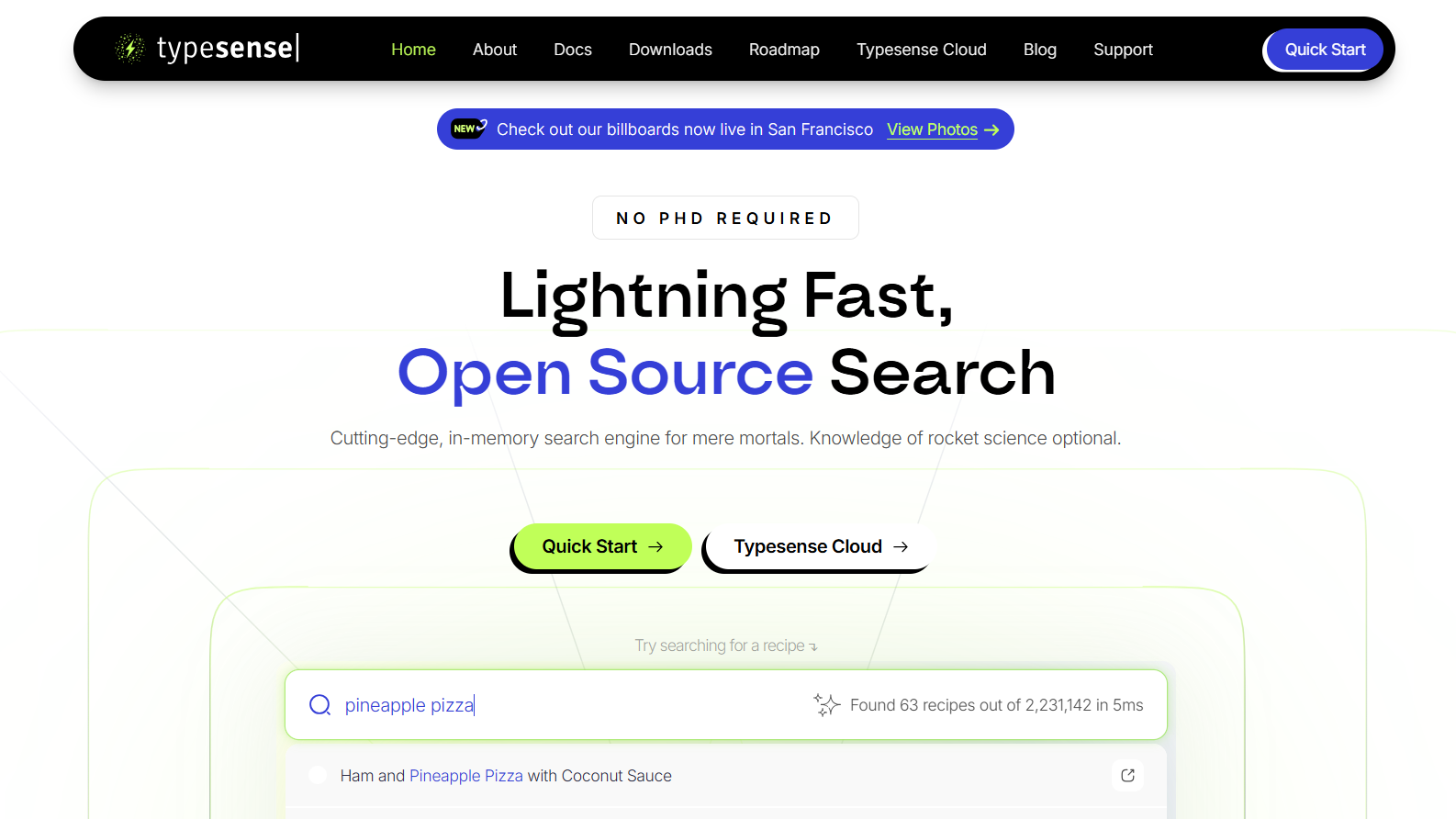
✅ Pros of Typesense
- Open-source: Free to use and fully self-hostable with no vendor lock-in.
- Blazing fast: Built in C++ for high performance and low latency.
- Typo-tolerant: Supports fuzzy matching and intelligent search out of the box.
- Developer-friendly: Simple JSON-based API with great docs and SDKs.
- Easy to deploy: One binary installation with minimal dependencies.
- Faceting support: Built-in filtering and faceted navigation for eCommerce.
- Autocomplete & instantsearch: Real-time results and dropdown suggestions.
- Secure by default: API keys and scoped search tokens enhance security.
❌ Cons of Typesense
- Limited AI/semantic search: No native support for vector or NLP-based search.
- Small ecosystem: Fewer plugins and integrations compared to bigger platforms.
- Basic analytics: No built-in analytics dashboard—requires external tools.
- Scaling needs manual setup: Requires effort to scale across nodes/clusters.
- No personalization engine: Lacks built-in tools for personalized ranking or user behavior learning.
- UI not included: You have to build or integrate your own frontend UI components.
- No merchandising tools: Doesn’t offer product boosting, pinning, or business rules.
- Small team/community: Active but much smaller than Elasticsearch or Meilisearch.
5. Search.io (Now Part of Algolia) – Semantic AI + SaaS
- Overview: Previously a top AI search alternative, now merged into Algolia’s NeuralSearch offering.
- Pricing: Merged into Algolia’s new plans—no longer standalone.
- AI Features: Yes. Vector search and neural ranking models.
- Merchandising: Visual tuning tools existed pre-acquisition.
- Best For: Teams already evaluating Algolia’s premium AI offerings.
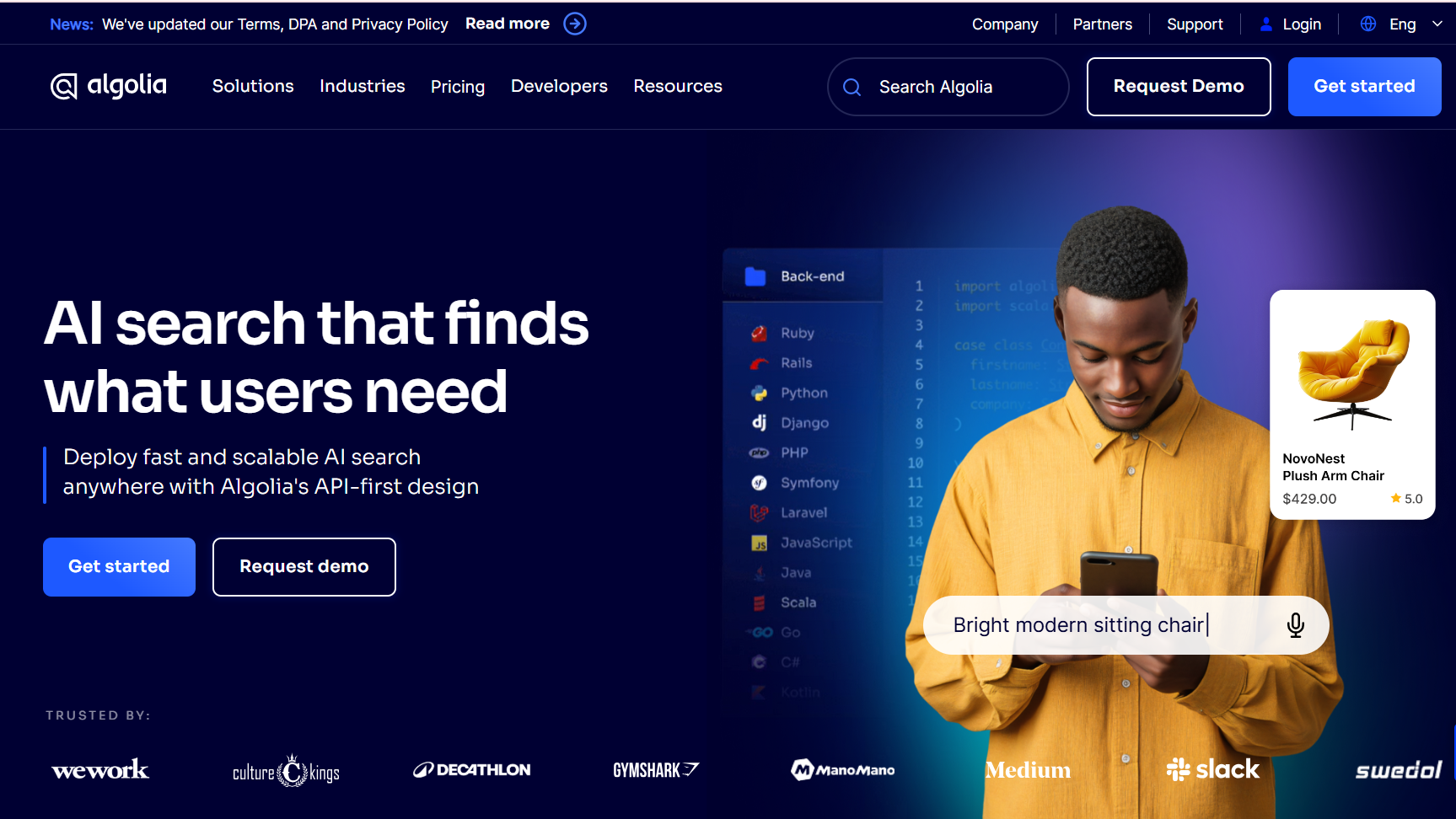
✅ Pros
- AI-powered search: Uses machine learning for automatic relevance tuning.
- Built for eCommerce: Facets, synonyms, boosting, and ranking are included.
- No-code UI editor: Easily build and customize search results pages.
- Auto-optimized results: Learns from clicks to improve future search ranking.
- Easy integration: Works with Shopify, BigCommerce, headless CMS, and others.
- Analytics dashboard: Tracks queries, conversions, click-throughs, and more.
- Hosted and managed: Fully cloud-based with zero infrastructure worries.
❌ Cons
- Closed-source: Not open-source, so no backend code visibility or ownership.
- Pricing not transparent: Requires contact for higher-tier features.
- Limited developer control: More of a SaaS UI-driven platform than a dev-heavy tool.
- Fewer customization layers: Not ideal for highly complex, custom ranking logic.
- Small community: Less community content or support vs open-source tools.
Feature Comparison Table
| Feature | Algolia | Expertrec | Meilisearch | Typesense | Elasticsearch |
|---|---|---|---|---|---|
| AI Search | Add-on | ✅ Included | ❌ | ❌ | ✅ (with setup) |
| Voice Search | ❌ | ✅ | ❌ | ❌ | ❌ |
| Image Search | ❌ | ✅ | ❌ | ❌ | ❌ |
| Pricing Model | Usage-based | Flat, transparent | Free/self-hosted | Free/self-hosted | Usage-based |
| Merchandising | Code-based | ✅ Drag-and-drop | ❌ | ❌ | ❌ |
| CMS Plugins | ❌ | ✅ | ⚠️ | ⚠️ | ⚠️ |
| Ease of Use | ❌ Dev-focused | ✅ No-code | ⚠️ Dev-focused | ⚠️ Dev-focused | ❌ DevOps required |
| Advanced Analytics | ❌ | ✅ CTR, Nulls, Conversions | ❌ | ❌ | ✅ Advanced aggregation and metrics via Kibana |
Why Expertrec Is the Smartest Choice for eCommerce in 2025
Expertrec isn’t just another search tool—it’s a full suite for intelligent product discovery:
- Fast Deployment: Go live in hours, not weeks. Ideal for fast-paced teams.
- Drag-and-Drop Merchandising: Control what appears for key queries without any code.
- True AI Search: Automatically learns from behavior to rerank results, reduce zero-result queries, and increase conversions.
- Voice & Multilingual Ready: Perfect for mobile shoppers and international brands.
- Predictable Pricing: Plans scale with your growth, not with your query count.
- Support That Delivers: 24/7 live chat and onboarding assistance at every level.
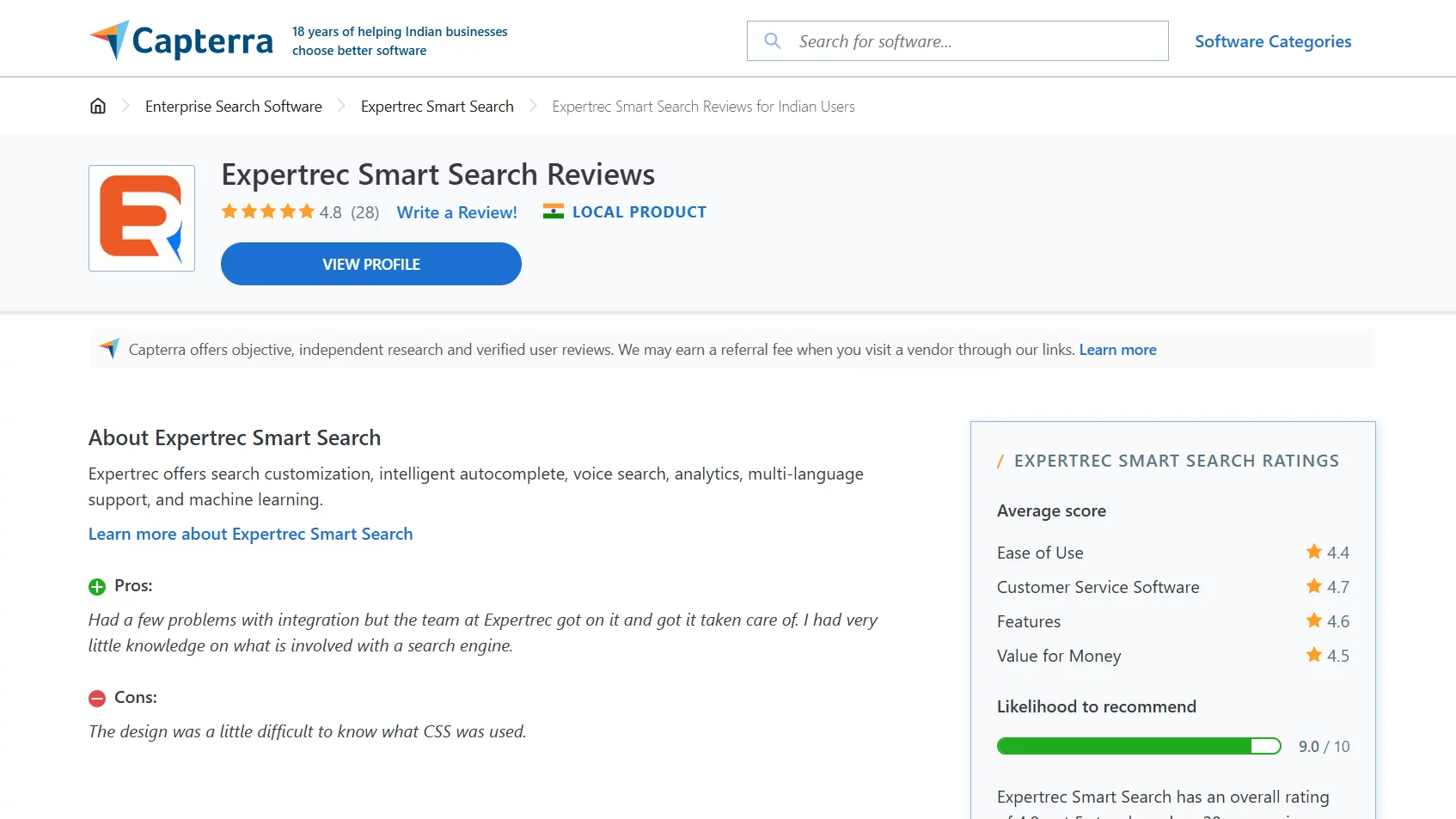
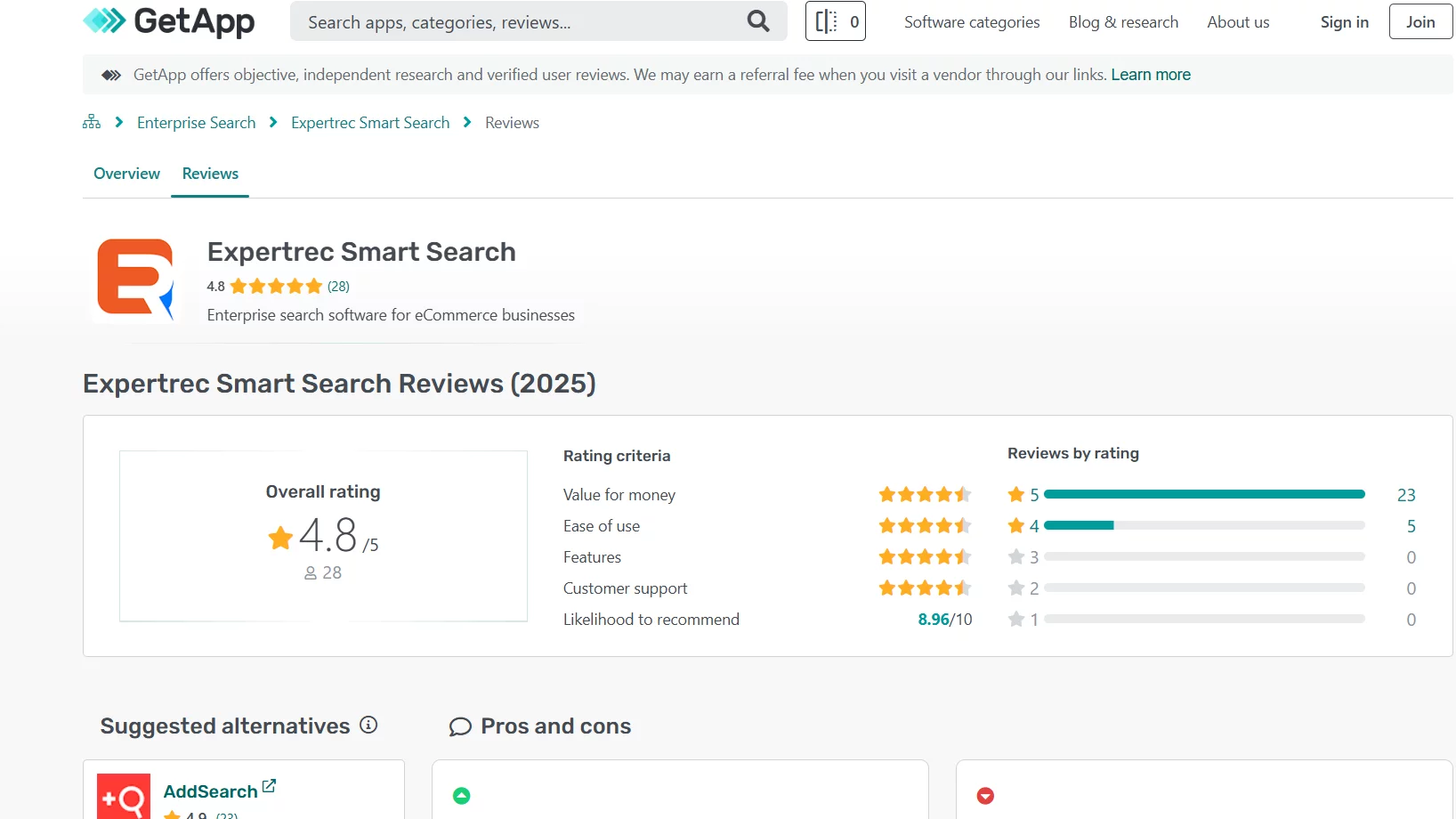
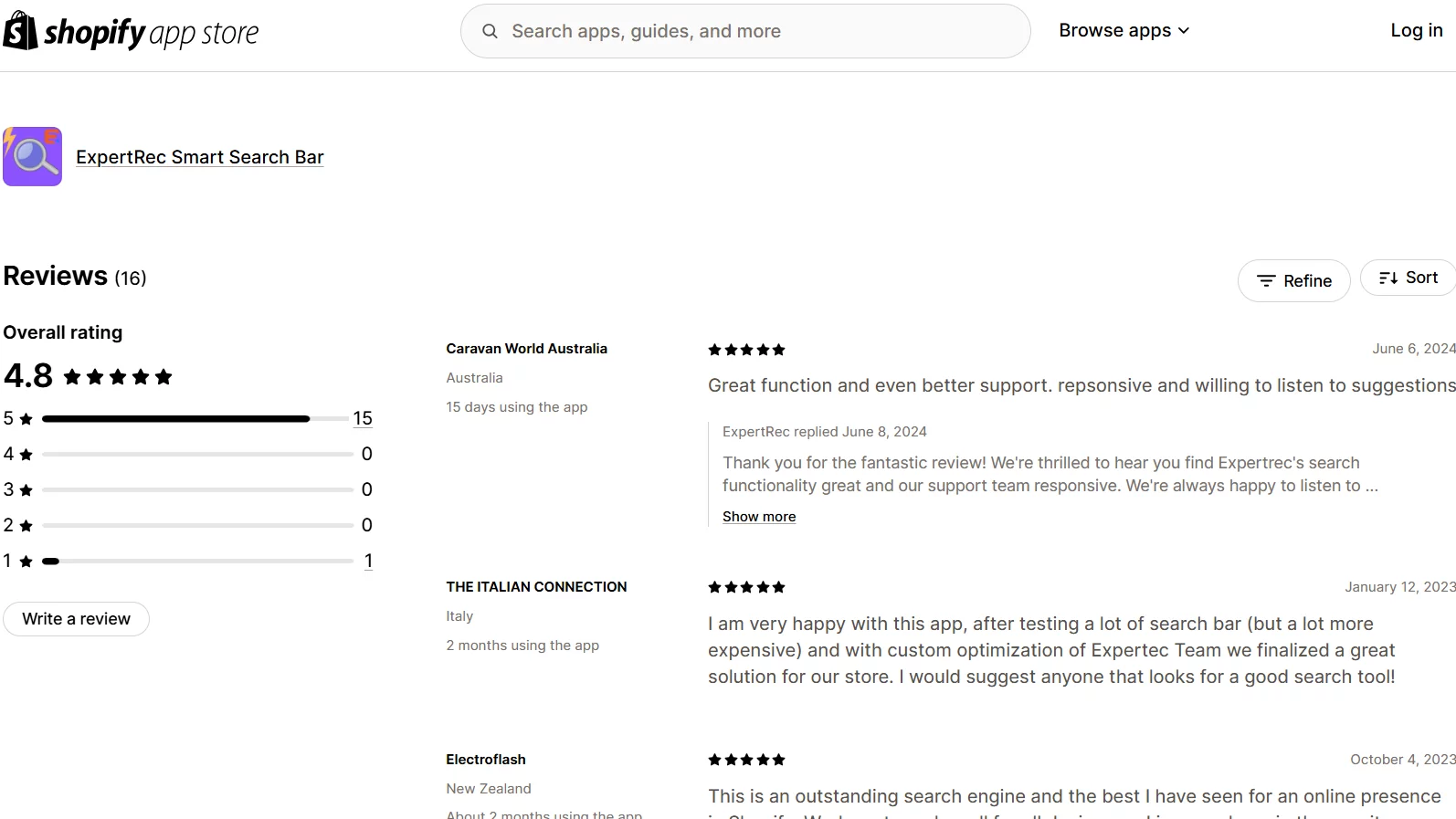
Here’s What Frequently Asked (FAQs)
✅ Expertrec. It includes semantic search and behavior-based personalization on all plans.
Q2: Can I migrate from Algolia without losing SEO or UX?
Yes. Expertrec provides seamless migration tools, API compatibility, and support to maintain indexing quality.
Q3: What platform should non-developers use?
Expertrec is designed for business users, not developers. Anyone can configure filters, ranking, and campaigns.
Q4: Is there a free version of any of these tools?
Meilisearch and Typesense offer free self-hosting options but lack built-in AI and visual tools.
Q5: Can I get analytics on what users are searching?
Yes. Expertrec offers CTR, zero-result queries, top-performing products, and filter usage analytics.
Q6: What’s the fastest setup option?
Expertrec. Just install the plugin (or paste a script), index your site, and go live.
Q7: What if I need help with integration?
Expertrec includes setup assistance and onboarding support even on its starter plans.
Q8: Does Expertrec support multilingual stores?
Yes. It automatically detects and indexes multilingual content with proper search rules.
Q9: Is Expertrec scalable for enterprise stores?
Absolutely. It can handle millions of products and queries with global CDN delivery.
Q10: What if I want to A/B test relevance models?
Expertrec’s dashboard supports controlled experiments for ranking tweaks.

Final Take: Choose Smarter Search That Grows With You
Algolia brought developer-friendly, lightning-fast search to the web. But the future of eCommerce search lies in:
- AI-powered understanding
- Voice-ready interactions
- Visual tools for merchandisers
- Simpler, transparent pricing
If you’re looking for a modern, scalable, and affordable alternative, Expertrec is purpose-built for you.
Start your free trial with Expertrec and future-proof your product discovery experience.
